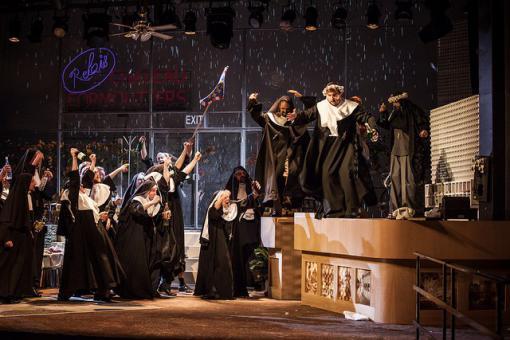Rossini’s penultimate opera Le comte Ory was in its time seen as highly immoral slapstick. In the new Brno production, performed in the historic building of the Mahen Theatre, it is actually a hilarious farce. Lenka Flory stands behind its directorial and artistic form, providing not only the needed humour and momentum, but also thanks to its basis in the world of contemporary dance also unusual movement.
The musical production is the first independent project by the young conductor Robert Kružík. He gave this brisk music the kind of impulses that are needed in Rossini’s comic operas, maintained the momentum and gradation, supported the singers in the difficult ornamented parts and helped to firm up the impression that this comedy by the composer to a libretto by Eugene Scribe in Paris 190 years ago was a true success.
The Count does not hesitate to dress up as a nun, so as to get close to the women. He manages it, but is finally caught and ignominiously expelled … The scene where he gets uninhibitedly drunk with his cronies while dressed as nuns in the house they have penetrated is irresistible: not just as the author’s idea, but particularly in the Brno production, where it is taken to comedic perfection. It is supported by precisely picked out and cogent music played and sung here with exceptional enthusiasm. The moment when the exuberant intruders must then for a moment pretend to religious innocence is hilarious.
The subject was the librettist’s own vaudeville, taken from older tales and traditional songs. For the opera however it was necessary, due to the French censor, to change the original location in a nunnery to a castle. Those threatened by male invasion in Rossini are no longer nuns, but noble ladies awaiting the return of their husbands from the crusades. The plot otherwise remains the same. A key figure is the page, the youthful Isolier, who plays on both sides – he advises Count Ory and at the same time he betrays him to the woman, because he is interested in the same one as his master.
Lenka Flory’s version goes even further: in a guest house young women are gathered together, their husbands having gone to a rugby match; their women have apparently promised that in their absence they will not let any strange men into the building. The racy nun’s disguise of the young Count Ory, apparently some kind of spoilt rich kid who has escaped the supervision of his father and his tutor, remains… So it is updated but sensitively and intelligently. The story is relocated to modern times, but it is not one of those cases of controversial directorial wilfulness that audiences reject. Rather the reverse.
The singing in the premiere on 26/5 was wonderful. It was led by Kateřina Kněžíková in the main female role of Adéla. She has a mature full-timbre voice and coped well with the challenges of Rossini-style coloratura. What is more she played her role absolutely naturally and with joy – in all details with typically feminine emotion. Ory was played by the young Hungarian tenor György Hanczár, a comedian with a not quite sufficiently big, but characteristically moving and suitably highly-pitched voice. He alternated in the role with Petr Nekoranec, a rising domestic star with international ambitions. It is being suggested that he should also be in the line-up of singers who are to take this production in September to Prague for the Opera Festival. Václava Krejčí Housková was very good in her singing and acting in the ‘breeches’ role of Isolier. Not long after Love From Afar by Kaija Saariaho, in which in Brno’s National Theatre he played the lyrical main figure of the troubadour, in Rossini’s Le comte Ory once more on the stage in a major role is the young baritone Roman Hoza – and he is once more excellent; he plays the slightly extrovert character of Ory’s companion Raimbaud and he is masterful with a nice big voice. In other roles Boris Prýgl and Andrea Široká appeared significantly on the stage. And the choir was wonderful, not only vocally well prepared, but also performing in a relaxed manner – especially the male part in the habits and headgear of nuns.
Lenka Flory, a theatrical producer with as yet little experience, breathed fresh air into this project and opera directing. She not only came up with good ideas, purposefully and inspirationally directed, but in many places became involved in what is truly choreography. There is a broad range of situations to which this observation applies: beginning with details and innovations, continuing through the disguised trio of Adéla, Isolier and Ory, brilliantly positioned on the couch and ends with the conception of whole scenes, perhaps most obviously in the case of the thunderstorm raging outside the windows. Rossini’s mature work, not performed in this country for decades, has shone at her hands - along with the contribution of the conductor Kružík. The soloists and choir performed in a relaxed manner. It is also gratifying that we can find here singers who can cope with Rossini’s virtuoso style.
The new production of Le comte Ory is real music theatre. It has many pluses – and it is a hot tip for audiences – both for musical and theatrical reasons. When was the last time we laughed out loud at an opera?
































No comment added yet..